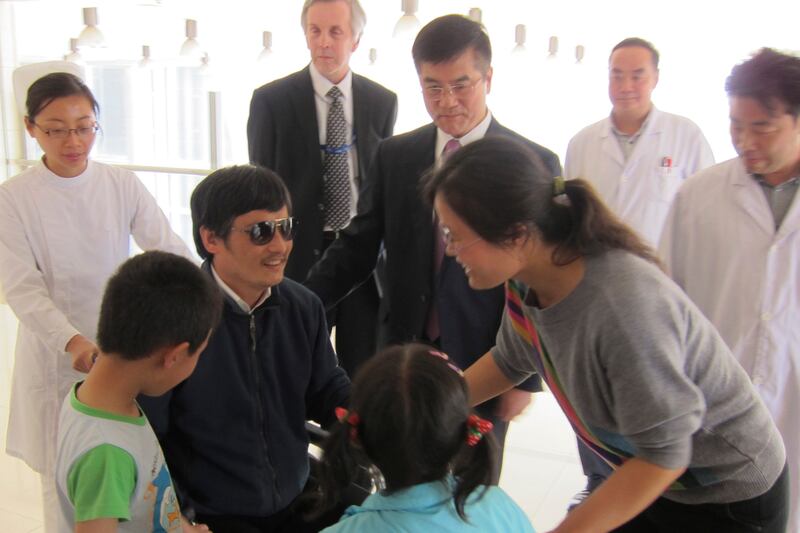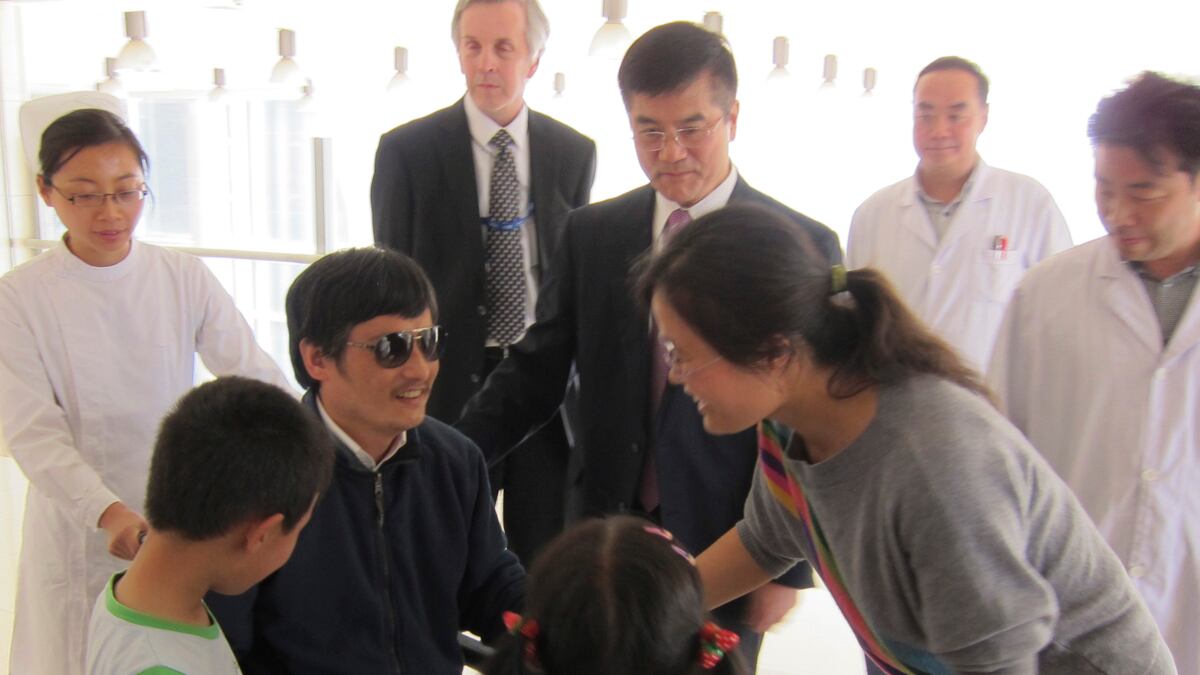At the end of his first full day out of the U.S. Embassy, the blind human-rights lawyer Chen Guangcheng still hopes to leave the country with U.S. Secretary of State Hillary Clinton.
"Things haven't changed; I still want to leave China," said Chen. He was phoning me from Beijing’s Chaoyang Hospital, about 12 hours after our previous conversation.
After leaving the embassy to much fanfare Wednesday, accompanied by U.S. Ambassador Gary Locke and several American officials, Chen found himself in the hospital alone save for his family—and numerous Chinese security officers patrolling the corridors. Despite promises by the Chinese government that he would be allowed to live in the nearby city of Tianjin and study law at a university, his new reality began to sink in. And then he panicked. Now back on Chinese soil, Chen no longer had the diplomatic power of the United States to keep him safe.
After a daring escape from nearly two years of extralegal house arrest in his village, Chen managed to obtain refuge in the U.S. Embassy for six days. While he was hidden inside, American diplomats spent hours with him each day as they negotiated with the Chinese government for his freedom. Chen initially did not want to leave China and did not seek asylum, U.S. officials said. The deal looked rosy until he met with his wife at the hospital where he is receiving medical treatment. But he claims to have been warned by American officials that the Chinese government had threatened to send his wife back to his village if he did not leave the embassy. Just what would befall her once she returned to the hands that had beaten her so many times was never explicitly stated to him—but he knew. Once American officials left the hospital for the night, his anxiety turned to desperation.

When I spoke to him early Thursday morning, his fear that the Chinese government would break its promise and reinstate a brutal campaign of terror against him and his family was palpable. All he wanted was to flee as soon as possible. He was sobbing. “My fervent hope is that it would be possible for me and my family to leave for the U.S. on Hillary Clinton’s plane,” he told me.
Secretary Clinton is in Beijing for the Strategic & Economic Dialogue, an annual two-day summit attended by hundreds of U.S. officials, including U.S. Treasury Secretary Timothy Geithner. Officials on both sides had worked frantically to negotiate a solution to the crisis over Chen before the summit began. That deadline blew up in their faces when Chen initially claimed American officials had pressured him into accepting a deal.
On Thursday, American officials finally addressed the swirling controversy and seemed to change their tune. U.S. Ambassador Locke—who the day before had said Chen’s departure from the embassy resolved the crisis—now claimed otherwise. Locke told reporters that Chen first wanted to go to the hospital and “then be able to talk with his wife, and that would enable him to make the very final decision on whether or not he would leave the embassy.”
American officials say they hope to help Chen, but their hands are much more tightly bound since he left the embassy. “We need to consult with them further, get a better sense of what they want to do and together consider their options,” State Department Spokeswoman Victoria Nuland told reporters.While it’s unclear why the Americans are telling a different story about the agreement now, their return to the hospital has brought Chen comfort. Although it appears the Chinese government has already gone back on its word to allow the U.S. unimpeded access to Chen—not a good sign.This time when I spoke to him he sounded less fearful and less exhausted. He said a U.S. official had come to the hospital this morning, but hadn't been allowed into his room.Instead the official spoke with Chen's wife. "He said U.S. officials would still like to help, but we're not sure they will be able to," Chen reported, adding that the official's visit had eased the sense of abandonment and desperation that had overcome him during our morning conversation. "I want to thank the Americans who've done a lot for me."Chen recalled that he was treated very well inside the embassy. One morning he was even given two breakfasts. "I was so moved," said. That memory was in sharp contrast to his treatment at the hospital, where his family was abandoned and left hungry by nurses who initially refused to bring them food.In our interview, Chen said the U.S. official told him that hospital authorities had asked the Americans to leave the previous night, in keeping with hospital regulations. Chen had assumed someone would stay with him. "I didn't know they were told to go away. I thought they had just left me alone."Even though his mood has improved, and his desperation has receded, Chen's situation remains precarious. Now that he's left the cocoon of American diplomatic protection, he's just another Chinese citizen inside a Chinese hospital that's swarming with Chinese security personnel who are turning away visitors and confiscating media credentials from journalists gathered there. Worse, he said "my phone is either malfunctioning or somehow being interfered with. It's very difficult to make and receive phone calls." Chen worried how he might communicate not only with family and friends, but also with any US official who comes to visit him in the future, if they're continually barred from seeing him.Yet no one should underestimate his steely determination. He had undergone an astonishing night-time journey to escape from the extra-legal form of house arrest that had kept him confined since September 2010 in his Shandong farmhouse. He said he had to evade 70 to 80 guards altogether, and to scale numerous walls. While clambering over the fifth wall, he fell and broke his foot. "It was extremely painful. After that I couldn't stand. So I crawled."He doesn't know how long he struggled along the ground. "It's hard to say, sometimes I had to wait for a long time until a guard wasn't paying attention, so that nobody could hear me." Blind since infancy, Chen used his other senses to navigate his way through the dark. "I waited until the wind was blowing, or until the guards were listening to music on their mobile phones, then I would start crawling again.” After some rest and the American official's visit, he sounded revived, and ready to resume the long hard journey ahead.






